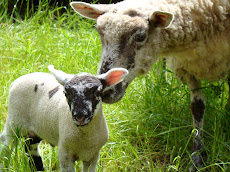Eggs have gotten a really bad rap recently. Egg yolks are high in cholesterol and fat. If you focus on just those two facts alone, then excluding egg yolks make sense. But eggs yolks are also full of copper, calcium, iron, folate, B6, vitamins A and E, carotenoids (lutein and zeaxanthin), omega-3 fatty acid, omega-6 fatty acid and many other things that are important to our health. But that isn't the whole story.
 The pictures on the right is of my egg, which is pasture raised, and their conventional large grade AA egg. When you think pasture raised, you probably thing a big grassy area with 50 chickens roaming around. But those 3 chickens in your backyard that are eating grasses and insects are also pasture raised. My chickens have a 12 X 20 foot run and when we are home they also get access to the rest of the farm.
The pictures on the right is of my egg, which is pasture raised, and their conventional large grade AA egg. When you think pasture raised, you probably thing a big grassy area with 50 chickens roaming around. But those 3 chickens in your backyard that are eating grasses and insects are also pasture raised. My chickens have a 12 X 20 foot run and when we are home they also get access to the rest of the farm.Some recent studies have been done on pastured eggs and the conventional egg. Studies show amazing difference - pastured eggs have twice as much vitamin A, eight times as much vitamin D, seven times as much beta carotene and three times as much omega-3 fatty acids as conventional eggs.
It is worth pointing out that "free range", a common label you seen on egg cartons, is not synonymous with pasture raised. "Free range" hens only have to be provided access to outside for 15 minutes a day. And access can mean a single 12x12 inch open door in a coop with hundreds of chickens. Those chickens don't have to go outside, they just have the option of going outside. So "free range" is just the same as conventional eggs.
One last point about raising chickens for eggs. You don't have to have a rooster to get eggs from your hens. I say this because recently on the show "Survivor" the winning team was given three hens and a rooster as a prize. The people were hungry so they decided to kill one of the hens for meat. They chose a hen because they thought they had to keep the rooster in order to get eggs. Actually, they could have killed the rooster and had 3 eggs per day to boot. (A rooster is only required if you want to raise little baby chicks.)













No comments:
Post a Comment